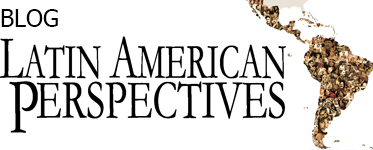Ecuador’s April 11 presidential election
by Marc Becker — 31 March 2021
On April 11, Ecuadorians will go to the polls to select their next president. On the
surface, the contrast between the two candidates seems stark and the choice clear.
Out of a record number of 16 candidates in the first-round vote on February 7, Andrés
Arauz and Guillermo Lasso emerged at the top of the polls.
Arauz of the progressive Union for Hope (UNES) coalition is a protégé of former
president Rafael Correa. Like Correa, Arauz is a heterodox economist who emerges out of a
Keynesian and developmentalist framework. Redistributive policies during Correa’s
administration resulted in notable socio-economic gains, including record drops in poverty,
extreme poverty, and inequality. Arauz presumably would return Ecuador to the model of using
the country’s natural resources to fund redistributive policies, even as the current debt crisis and
relatively low commodity prices provide less favorable conditions.
Lasso, in contrast, is a rightwing Opus Dei adherent and a banker who has been
personally responsible for many of the neoliberal ills that have plagued Ecuador over the last
quarter century. The legacy of his role as a “super minister” that oversaw an economic collapse
in 1999 stills weighs most heavily on the poor and marginalized. His regime would return the
country to the worst aspects of savage capitalism and fuel unprecedented upward redistributions
of wealth, even as now he is making populist promises in a desperate ploy to win election.
Depending on one’s class position in the means of production, a decision in the context of
this stark choice should be crystal clear.
But in politics, nothing is ever clear.
Significantly complicating this narrative is the third-place challenger in the February 7
vote: the environmental activist Yaku Pérez of the Indigenous Pachakutik movement. Pérez
registered a surprisingly and unprecedented strong showing in the first round, and was only
narrowly edged out by Lasso for the right to go head-to-head with Arauz in the second round.
This led to a jockeying for position, baseless accusations of fraud, and finally a call to boycott
the April 11 elections with declarations that neither populism nor neoliberalism are viable
options.
Many external observers stood by while our Ecuadorian counterparts proceeded to
hammer away on each other over social media. The narratives could be nasty. Correa supporters
resorted to frankly racist narratives to denounce Pérez’s candidacy, and hanging over the heads
of Pérez and his supporters were comments from the election four years previous that they would
prefer the neoliberal banker Lasso over the “dictator” Lenín Moreno, who was then campaigning
as a stand-in for the popular president Correa. The two sides which seemingly should share the
goal of overcoming economic inequality and racial oppression appeared more interested in
attacking each other rather than fighting a common enemy of neoliberal economic policies.
I built my academic career on the twin agenda of demonstrating that the left is not racist
and that Indigenous movements must be understood as an integral part of the left. The 2021
elections in Ecuador appear determined to prove me wrong on both counts.
These deep-seated conflicts that are only getting worse and show no evidence of taming
any time soon emerge from a pattern of social movement organizing in the 1990s that opened the
floodgates to a wave of progressive governments across the hemisphere at the dawn of the
twenty-first century.
Several things, however, must be kept in mind. First, and most importantly, for all the
talk of dual power, the logics of social movement organizing and political party strategies are
inherently contradictory and conflictual.
Historically strong Indigenous movements in the 1990s that repeatedly pulled down
neoliberal governments that ruled against their interests have had difficulties translating that
pressure into electoral success. Sustained protests against Moreno’s neoliberal policies in
October 2019 paved the way for Pérez’s unexpectedly strong showing in February 2021, even as
his campaign remained strangely divorced from that grassroots pressure.
Second, as José Antonio Lucero notes, we must think of movements in the plural and
recognize their diversity.
Deep divisions run through Indigenous movements in Ecuador, with identifiable left and
right wings. Pérez, who had consolidated his political profile as an anti-mining opponent during
the Correa administration, emerged as the presidential candidate for Pachakutik rather than
others who forwarded a more explicitly leftist and anti-neoliberal critique of the current situation.
Third, many of these issues appear differently when viewed internally in Ecuador rather
than through an international lens.
With U.S. imperial forces holding the Latin American left under siege (and in this there is
little difference between Trump’s and Biden’s policies), having a faithful ally in Arauz would
give those governments seeking to rule on behalf of the poor and dispossessed a little bit of
breathing room. But, logically as is always the case, motivations for voters in Ecuador are much
more immediate and closer to home.
Fourth, the current political landscape in Ecuador explodes a simplistic continuum from
left to right. This emerges particularly evident in gaps between seemingly progressive rhetoric
and clientelistic strategies and proposals on all sides. A long pattern in Latin America is to “talk
left, rule right,” to campaign on progressive populist promises to gain popular support to get
elected, but disavow those once in power because of the threat of entrenched economic and
political interests.
Historically Ecuador has had a well-organized left that repeatedly has been frustrated in
its attempts to gain power. But if we understand the left as encouraging participatory democracy
and transforming the country’s mode of production, one can rightfully ask, where is that left
today and who represents it? Does it even exist anymore?
Despite a minor and seemingly momentary blip with “pink-tide” governments at the
beginning of the century, during our lifetimes politics globally have consistently and
depressingly slid ever rightward. The 2021 Ecuadorian elections won’t alter that bearing, but
they can feed an impression of either slowing or accelerating that tendency.



